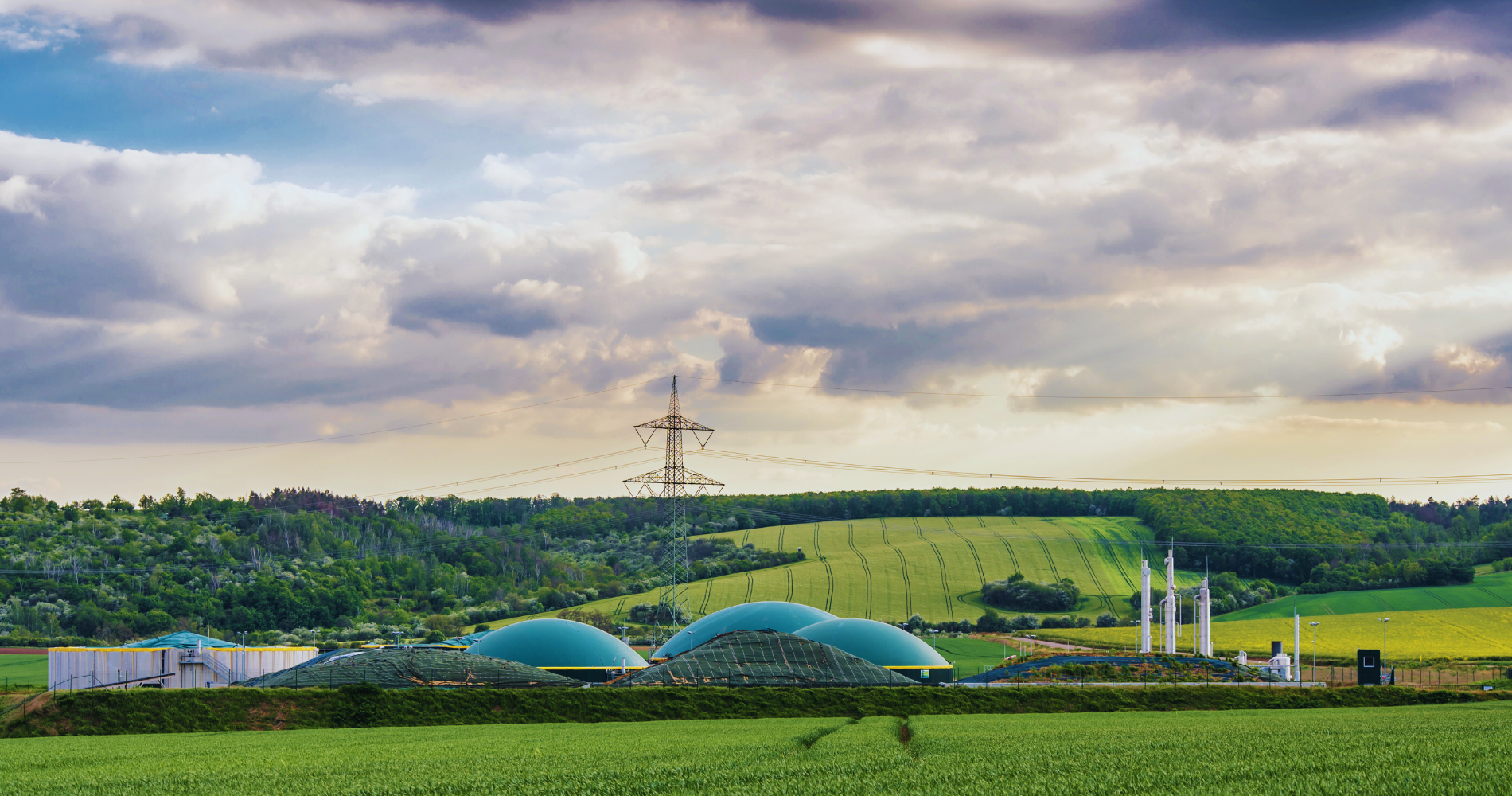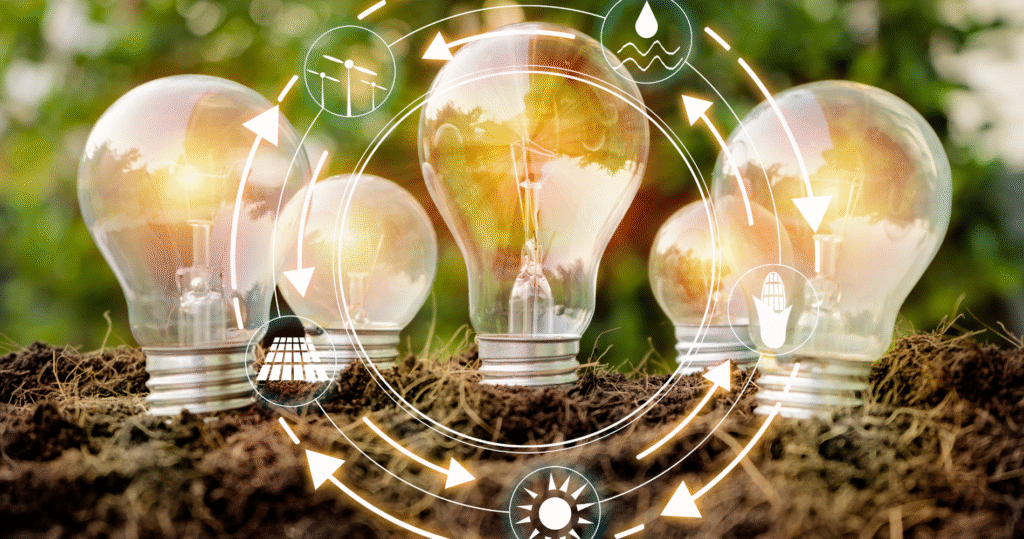In recent years, the global energy transition has taken tangible shape — and following the consolidation of solar energy in the past decade, biomethane is emerging as the protagonist of a new era, especially in Brazil. A renewable gas produced from the decomposition of agricultural, urban, and industrial waste, biomethane is recognized not only for its decarbonization potential but also for its role in integrating energy, industry, and the circular economy in a virtuous cycle with social, environmental, and economic impacts.
Biomethane: definition, production, and environmental impact
Biomethane is a fuel produced by purifying biogas, which originates from the anaerobic decomposition of organic matter such as agricultural waste, solid urban waste, industrial residues, and organic effluents. Unlike fossil natural gas, biomethane has a renewable origin and can drastically reduce greenhouse gas (GHG) emissions.
One of the major environmental benefits of biomethane is the mitigation of methane emissions — one of the most potent greenhouse gases, with a global warming potential 28 times greater than that of carbon dioxide (CO₂). By capturing and utilizing this methane, emissions that would otherwise be released into the atmosphere are converted into clean energy, preventing their climatic impact.
In Brazil, the technical potential for biomethane production is significant. According to the Brazilian Biogas Association (ABiogás), the country could replace up to 70% of its current diesel consumption, especially in heavy transport and agribusiness sectors, which traditionally depend heavily on fossil fuels. The co-production of biomethane uses residual materials that, if not harnessed, could generate significant environmental liabilities — reinforcing the connection between biomethane and the circular economy.
Market expansion and regulatory advances
Brazil’s biomethane sector is undergoing rapid expansion. Recent studies indicate that national production could grow by over 215% by 2027 — from the current 656,000 cubic meters per day to approximately 2.3 million m³/day. The state of São Paulo currently accounts for around 40% of national production and leads expansion projects, where biomethane could replace up to 85% of diesel consumed in heavy transport, reducing more than 90% of equivalent CO₂ emissions.
This growth has been catalyzed by significant progress in Brazil’s regulatory framework. Since September 2025, Decree No. 12.614/2025 has been fully implemented, regulating Law No. 14.993/2024 and integrating the program known as “Fuel of the Future.” This program not only establishes incentives for the production and use of biomethane but also creates a regulated market with mandatory targets. A key highlight is the creation of the Biomethane Origin Guarantee Certificate (CGOB), a crucial instrument for tracking production, ensuring transparency, and enabling the trading of decarbonization credits.
In addition, the Ministry of Mines and Energy (MME) has launched a public consultation to define initial biomethane purchase targets for 2026 — a key step toward calibrating prices, ensuring adequate supply, and stimulating investments in essential infrastructure. Meanwhile, Bill No. 2.647/2022, under discussion in the National Congress, has been amended to include biogas and biomethane as priority guidelines for renewable energy incentives, especially in rural areas, to strengthen family farming and promote the bioeconomy.
Biomethane and the circular economy: a sustainable cycle
Biomethane represents a symbiotic link between energy and the circular economy. The production of gas from urban, agricultural, and industrial organic waste transforms what would otherwise be an environmental liability into an economic and energy asset.
This model creates a closed loop: collected waste is sent to treatment facilities that convert organic matter into biogas. After purification, biogas becomes biomethane, which can be used to fuel vehicles, generate electricity, or supply industrial processes — reducing dependence on fossil fuels and closing the waste reutilization cycle.
A practical example of this circularity was implemented in Rio de Janeiro, where Comlurb replaced part of its diesel-powered truck fleet with biomethane-powered vehicles produced from the very urban waste the company collects — reducing pollutant gas emissions by up to 99%.
Economic impact and opportunities for industry
Beyond environmental benefits, biomethane offers significant opportunities for industry and the national economy. The production growth driven by public policy directly translates into job creation and investments in technology and infrastructure.
Studies estimate that expanding biomethane production could generate around 20,000 new jobs in São Paulo alone by 2027. Moreover, major corporations have shown increasing interest in the sector, integrating carbon credits and pursuing actions that positively impact their environmental footprint.
For Brazilian industry, adopting biomethane provides a strategic lever for energy transition, enhancing competitiveness and reducing operational costs. Biomethane emerges as a solution to decarbonize hard-to-abate sectors such as heavy transport, agriculture, and industrial processing.
Energy security as both challenge and opportunity
By replacing imported fossil fuels, biomethane strengthens the country’s energy security. Brazil currently consumes about 65 billion liters of diesel per year, with over 20% of that volume imported. By harnessing just 20% of its technical biomethane potential over the next decade, Brazil could cut its external diesel dependency in half, reducing exposure to market fluctuations and geopolitical crises.
The existing infrastructure of pipelines, fuel stations, and biogas production centers provides a strong foundation for integrating biomethane into the national energy matrix — simplifying logistics and reducing costs.
Future outlook and challenges
Despite its promising outlook, the biomethane sector still faces challenges. Key issues include expanding distribution infrastructure, maintaining price competitiveness against fossil fuels, and increasing the sustainable supply of feedstock.
To overcome these barriers, dialogue among government, industry, rural producers, and consumers is essential to refine regulatory mechanisms, ensure appropriate incentives, and foster technologies that improve production efficiency.
The federal government, through the Ministry of Mines and Energy, has been conducting public consultations and promoting discussions to refine targets and policies — aiming to balance market development with competitiveness.
The decade ahead places biomethane at the core of Brazil’s energy transition. At its essence, biomethane represents more than just a renewable fuel — it symbolizes the sustainable integration of energy, industry, and the circular economy, delivering significant environmental benefits, fostering technological innovation, and strengthening national energy security and autonomy.






